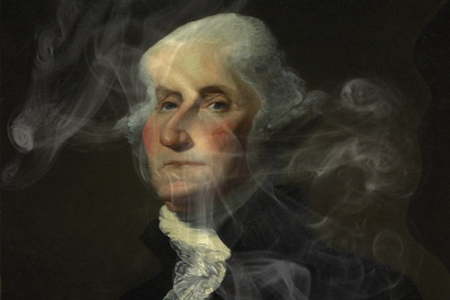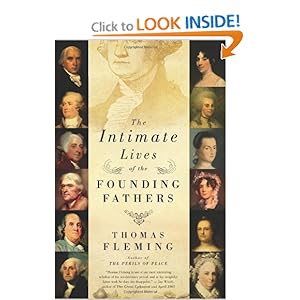Channelling George Washington: How Much Should the Majority Rule?

Credit: Wiki Commons/HNN staff.
 “I’ve never seen Jemmy Madison so worried.”
“I’ve never seen Jemmy Madison so worried.”
“Mr. President! I haven’t heard from you for a while.”
“I was waiting for the election campaign to end. I try to be neutral in these contests. I just look and listen, hoping for the best.”
“What’s worrying you and Mr. Madison? This so-called fiscal cliff?”
“That’s a minor anxiety compared to what’s disturbing us. It’s the triumphal tone the Democratic Party is exhibiting about their victory. It’s an attitude that has had a lot to do with creating the bitter partisanship that has been dividing the federal government. For Jemmy Madison it has a particularly alarming sound.”
“Why is he so sensitive on the subject?”
“As you no doubt know, Jemmy largely wrote the Constitution. At the 1787 convention, he didn’t get his way on every point. But he was still responsible for the central ideas. One of the most important is the danger of unrestrained majority rule. He summed it up in an essay he wrote for the Federalist Papers.”
“Perhaps you should remind us what these essays were.”
“They were a defense of the Constitution to help get it ratified by the states. Jemmy collaborated with Alexander Hamilton and John Jay to write them. His essay number 10 is one of the most famous. He pointed out that in a pure democracy, matters were too often decided not according to the rules of justice and the rights of a minority party, but by the superior force of an interested and overbearing majority.”
“Does this mean the United States is not a democracy?”
“It’s definitely not a pure democracy, where everything is put to a popular vote. That’s been a formula for disaster, back to the days of the Greek city-states. Invariably, the people got tired of governing themselves and voted in a dictator. That’s why the Constitutional Convention created a republic, in which representatives elected by the people govern. It has checks and balances built into the system to give the minority a chance to assert its voice.”
“Didn’t Mr. Madison say something about the advantage of a large republic?”
“He thought that was almost as important as the checks and balances. The larger the republic, the more likely it would be able to resist reckless majority rule. A bad idea may ‘kindle a flame’ as Jemmy put it, in some states, but it won’t ‘kindle a conflagration’ in other states. That’s been true for most of our history.”
“Were the two houses of Congress also designed to control runaway majority rule?”
“Definitely. I summed it up one day for Tom Jefferson, when he was my secretary of state. He’d spent too much time in France as our ambassador, watching their revolution begin. He wondered why we bothered to have a senate. The French were doing nicely with their National Assembly. I told him we had a senate for the same reason that some people poured steaming hot coffee into a saucer. To give it a chance to cool. The Senate was designed to prevent hotheads in the House of Representatives from running amok.”
“The French soon demonstrated the truth of that metaphor.”
“You can say that again. When preachers of class hatred seized control of their wonderful assembly, tens of thousands of innocent people died. Moral, reasonable men like my friend the Marquis de Lafayette were either forced into exile, or simply slaughtered.”
“Did that change Mr. Jefferson’s mind?”
“Not as much as it should have. He stayed a majority-rule extremist to the end of his days. At one point, when the French radicals and their blood-soaked guillotines were working overtime, he told a friend that rather than let their revolutionary cause fail, he was prepared to tolerate a slaughter so total, there would only be an Adam and Eve left in most countries.”
“Have other presidents veered toward overreaching the idea of majority rules?”
“A good example is Frank Roosevelt’s attempt to pack the Supreme Court in 1937.”
“Could you tell us more about that?”
“Frank got very annoyed with the Court when they declared quite a few New Deal programs unconstitutional. When he was reelected in a landslide in 1936, Frank decided he had the authority to overhaul the government. He proposed a constitutional amendment that would enable the president to appoint an extra justice every time a sitting justice reached the age of seventy. Since a high percentage of the court was already over seventy, Frank would have won instant control.”
“What happened?”
“Even though both houses were heavily Democratic, Frank couldn’t get the bill through Congress. Too many members saw its potential to create an unchecked tyranny. The resulting brawl shook a lot of people’s confidence in the federal government, and pretty soon the country plunged into a replay of the worst of the Depression -- and the Republicans made a big comeback in the 1938 elections.”
“Was FDR an admirer of Mr. Jefferson?”
“He worshipped him. Every year on Tom’s birthday, Frank sent a bouquet of flowers to Monticello to be placed on his grave.
“I guess you could say Americans have always been wary of unchecked power.”
“Let’s hope they always will be. I wish more Americans were aware of words that James Madison wrote in a letter to his friend Mr. Jefferson: “Wherever there is an interest and power to do wrong, wrong will generally be done, and not less readily by a powerful and interested party than by a powerful and interested prince.”
"Are there any specific wrongs you’re worried about at the moment?"
“Abusing and denigrating and overtaxing the rich.”
“Are you opposed to higher taxes on them?”
“I see nothing wrong with a modest increase. But it will only pay for a tiny percentage of what we owe, thanks to the wild overspending of the last decade. I don’t like the current tone of hostility, even contempt, in recent political references to the rich. It has ominous echoes of class warfare -- a fatal experience for any country.”
“Has America always had wealthy people?”
“Of course. In 1776, well over half the wealth was controlled by a few people. But we also had a thriving middle class, who lived comfortably and worked hard. I was one of the rich. I devoted my life to serving this country. So did Jemmy Madison. You can’t sum up any group of people with a political slogan. Especially if there’s hatred and envy mixed into it.”
“I begin to see why you and Mr. Madison are worried.”
